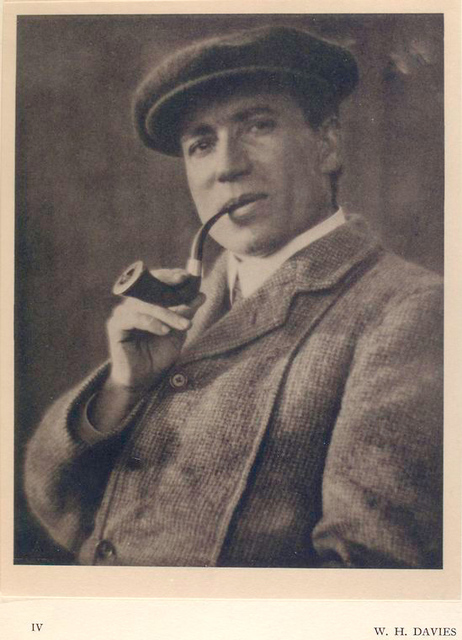A summary of a piece of writing is a way of memorizing the main line of action or scheme of ideas. Leisure poem summary is one of the most searched items of the poet William Henry Davies on the web. Leisure poem summary will help you remember the order in which William Henry Davies has put up his ideas. It will help you attempt any question at any Board or University levels. Leisure poem by William Henry Davies is a part of the English syllabus of the University of the Punjab for BA/ADA classes.
Leisure
(William Henry Davies)
The Poet

William Henry Davies, a Welsh poet, was born on July 3, 1871, in Newport, United Kingdom. He spent most of his life as a tramp in England and America. Still, he was one of the most celebrated poets of his time. His poetry revolves around the themes of everyday human life and its hardships, ever-changing modes of human life and their impact on human feelings and emotions, the ever-sharpening class divide, and man’s indifference to nature. Edward Thomas, a friend of William Henry Davies and a poet himself, opines that in his treatment of nature, William Henry Davies is very close to William Wordsworth who is known as a poet and priest of nature.
As far as his writing style is concerned, unlike his contemporary Georgian poets, his verse is simple and straightforward. He does not resort to poetic complexities, and there is nothing ambiguous in his presentation. William Henry Davies dies on September 26, 1940.
Here are the text, summary, and important questions of one of his most celebrated poems, Leisure.
What is this life if full of care,
We have no time to stand and stare?
No time to stand beneath the boughs,
And stare as long as sheep or cows:
No time to see, when woods we pass,
Where squirrels hide their nuts in grass:
No time to see, in broad daylight,
Streams full of stars, like skies at night:
No time to turn at Beauty’s glance,
And watch her feet, how they can dance:
No time to wait till her mouth can,
Enrich the smile her eyes began:
A poor life this if full of care,
We have no time to stand and stare.
Leisure Poem Summary
The poet begins with a question about the worth of this life if it is full of worries and cares. He believes that it is because of the rush and unnecessary preoccupation of modern man’s life. It is the reason that modern man cannot appreciate nature as much as the animals like sheep and cows can.
He does not notice the innocent activity of the squirrels hiding their nuts in the grass. Man of this age has no time to see the similarity between the night sky and a stream in daylight. He cannot even admire the beauty, dance, and smile of a charming woman. The poet ends the poem with a declaration that this life is poor if it is full of worries and cares. He considers man’s materialistic approach and indifference to nature the only reasons for it.
Important Questions on Leisure poem
Q1: What is the theme/main idea of the poem?
Q2: What are some of the simple delights we miss in our everyday life?
“Leisure” is a short but very beautiful poem by William Davies. In a few lines, the poet highlights a very important aspect of modern life. Modern age is the age of industrial progress and material prosperity. Man of this age is a slave of his desires. He remains busy gaining more and more material facilities. However, in his preoccupation, he separates himself from the beauty of nature. He rejects the Keatsian philosophy of beauty. According to the great Romantic poet: “A thing of beauty is a joy forever.” Modern man practically disagrees with it. As a result, his mind is always full of worldly anxieties and cares. In this poem, the poet criticizes and satirizes this attitude of modern man who misses many simple delights in his everyday life.
The poet says that this life is meaningless if it is full of worries and cares. We have no time to stand and stare at the beautiful objects of nature scattered around us. He is of the opinion that we are inferior to even sheep and cows because they spend more time in the company of nature than we do. Modern man has deprived himself of this aesthetic satisfaction. That’s why, he pays no attention to the innocent activities of the squirrels while he passes through the woods. These innocent animals hide their nuts in the grass. It is a reflection of the simplicity of nature. Modern man cannot observe similarities between the night sky and a stream shining in broad daylight.
William Henry Davies makes effective use of a literary device known as “Personification”. The poet personifies Beauty. He says that modern man is so engaged in materialistic pursuits that he will ignore even the goddess of beauty if he comes across her. Her fascinating dance and attractive smile have no importance to him. The poet declares that this life is poor and miserable if it is too full of cares to allow man some moments of leisure and pleasure.
Personification
*Personification is a kind of metaphor. It is one of the most frequently used literary devices. It represents inanimate objects or abstract ideas as persons or endowed with personal attributes.
**In this poem, the poet personifies Beauty. He is of the view that even beauty in its perfect form cannot inspire modern man. It is a curse of modern life.
Multi topic essay for BA English is also available for students.




It is very impressive poem.Full of knowledge.
[…] a virtual class can download a lecture. They can watch the same lecture even in their time of leisure. Also, they can view the discussion in the comment […]
[…] calm. Owing to a tight professional routine, we cannot spare time even for our family. There is no leisure in life. We continue to indulge in unnecessary worries. An excursion can relieve us of this […]